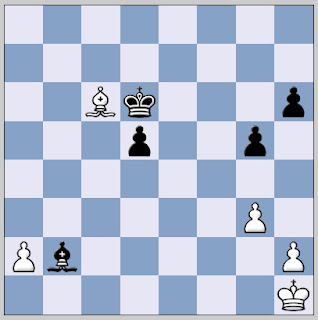I've already written, in Beating Grandmaster Danny Gormally, about how a difference in reputation and ratings often leaves a player psychologically beaten even before a piece has been moved. A game I played earlier this week in the Northumberland County Championship illustrates some further factors:
My opponent, Chris Wardle, has had a good season and is improving, but nonetheless he is rated some 50 BCF points (about 400 Elo points) lower than me. So, despite the fact it was a dead game in terms of the Championship, there was no way I could allow him an easy game.
The lack of easy games, i.e. games missing a competitive edge or games that may be agreed drawn early (after a level opening or middle game) between players of similar ratings, is one of the factors that makes it more difficult for the lower rated player. Not only do they have to raise their game and match you through the opening and the middlegame, but invariably they will have to maintain their concentration and competitiveness through long endings; Simply, they need to play more moves to earn their result.
In our game this week, Chris (as Black) battled hard, at least matched me through both the opening and middlegame, and reached the following ending where with the opposite coloured bishops a draw seemed the obvious result. I even have to be a little careful as Black's king is well centralised and his d-pawn quite advanced.

My thought process on reaching this position was:
Quick check that I wasn't actually in any danger of losing. OK, 2 solutions: I can bring my king across to stop the d-pawn on the light squares, or I can exchange off Black's g-pawn, sacrifice my bishop for the d-pawn, and I'm fine because Black's bishop is the wrong colour to queen the h-pawn.
The bigger problem was how on earth could I drum up any winning tries. An idea came to mind based around enticing Black's king out of play, i.e. by giving up my bishop for Black's d pawn when it queens, in which case, Black's king on d1 wouldn't be able to assist his bishop in stopping my pawns. I would then be winning if I had captured both Black's king side pawns and had my g and h pawns vs. Black's bishop, or if I had outside passed pawns on the a and h file vs. Black's bishop.
This is the second factor, the stronger rated player will avoid the lines that lead to simple equality and instead be continually examining the weaker player with testing plans.
Of course, in this position, Black can defend in a number of way and none of these tries should be sufficient. In the game though, Chris failed this final examination, he didn't spot any danger and instead played into White's hands by following the 'logical plan' and forcing his d-pawn through to queen:
Play went:
1. Ba4 Kc5 2. Kg2 Kd4 3. Kf3 Kc3 4. Kg4 d4 5. Kh5 Bc1 6 Kxh6 Be3 7 Bd1 d3 8 Kg6 Kd2 9 Bg4 Kel??
Even now, Black could have held the game by retreating 9. ... Kc3, winning White's a pawn in exchange for his d pawn with a simple draw by giving up his Bishop for White's final pawn on the king side.
10. h4 gh 11. gh d2 12. h5 d1=R 13. Bxd1 Kxd1 14. h6 reaching the position below:

Only at this stage did Black realise that his position was lost, and after 14. ... Kc2 15. h7 he resigned.
As I thought about this post, I was reminded of a couple of quotes (probably mis-quotes):
On the subject of reputations, Kasparov (I think) during his first world championship match with Karpov said:
"before I'm able to win against him, I first have to prove that I'm able to draw against him"
And Karpov himself, when asked in the early 70's what English players could do to improve, had asked what we do now. When he received the reply: "I don't know, I guess we play a lot and study the openings a lot", he said
"do the opposite, study the endings"

No comments:
Post a Comment